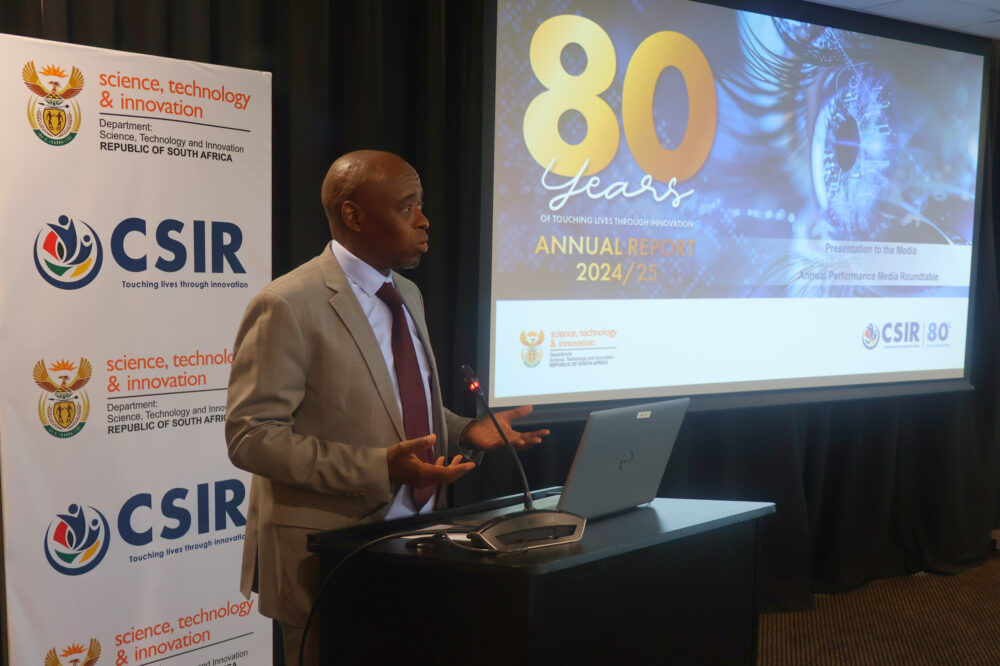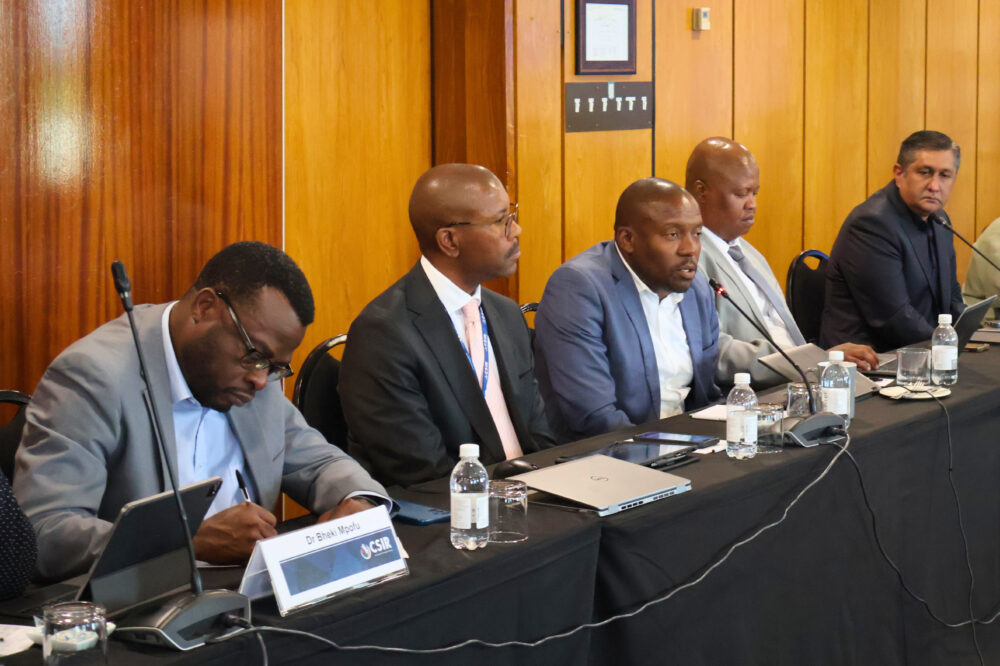CSIR CEO and Executives at the recently held Annual performance roundtable
The CSIR continues to play a critical role in addressing South Africa’s developmental challenges, particularly poverty, unemployment and inequality, in line with its mandate. This is according to Dr Thulani Dlamini, chief executive officer of the CSIR, who presented the organisation’s annual report for the 2024/25 financial year this week in Pretoria.
Exceeding financial targets
He said the organisation is financially stable and has exceeded its financial targets by increasing its operating income by 11%. This represents a growth from R3.17 billion in 2023/4 to R3.54 billion in 2024/25. Dr Dlamini said the CSIR has also achieved 29 of its 31 key performance indicators (94%). There has also been noticeable progress in this year’s performance compared to the 2023/24 financial year.
For instance, there has been an 11% increase in localised technologies; a 17% rise in joint technology development agreements with industry; a 3% increase in supported small, medium and micro enterprises (SMMEs); a 22% increase in projects implemented for government and SOEs; a 27% increase in publication equivalents; a 31% increase in the number of chief researchers; and a net profit of R40.62 million, against a projected loss of R67.6 million.
 CSIR Chief Executive Officer, Dr Thulani Dlamini presenting at the recently held CSIR annual roundtable where he reiterated the organisation’s commitment to continue playing a critical role in addressing South Africa’s developmental challenges, particularly poverty, unemployment and inequality, in line with its mandate.
CSIR Chief Executive Officer, Dr Thulani Dlamini presenting at the recently held CSIR annual roundtable where he reiterated the organisation’s commitment to continue playing a critical role in addressing South Africa’s developmental challenges, particularly poverty, unemployment and inequality, in line with its mandate.
Proper internal controls
In addition, the organisation has maintained its Level 1 B-BBEE rating, and received a clean audit opinion from the Auditor-General of South Africa, – a record it maintained for 15 years in a row. This re-affirms the depth of the organisation’s internal controls, financial reporting and compliance systems, argued Dr Dlamini. “These achievements underscore the CSIR’s dedication to transparency, accountability and ethical leadership across all areas of operation,” he added.
Deploying scientific innovations
For 80 years since the organisation was formed, CSIR has been at the forefront in deploying scientific innovations to serve society, government and industry. Dr Dlamini said the organisation always strives to ensure that its technologies and solutions to both government and industry, help improve in delivering quality services, competitiveness, job creation and transformation.
Assisting state-owned enterprises
CSIR also invests and leverages its latest technologies to help build state-owned enterprises (SOEs)’s capacity to meet their obligations. The technologies range from artificial intelligence, data analytics to information security, advanced materials, and robotics. “These results demonstrate the CSIR’s ability to deliver innovative, value-adding solutions to its industry and government partners. They also reflect the organisation’s growing relevance in advancing South Africa’s industrial development and its role as a trusted partner to the state,” said Dr Dlamini.
 CSIR Annual Performance Roundtable: The CSIR releases annual report, detailing sound all-round performance
CSIR Annual Performance Roundtable: The CSIR releases annual report, detailing sound all-round performance
Fostering strategic partnerships
He said they value and continue to foster strategic partnerships with industry players. For instance, CSIR has signed 12 new license agreements with industry partners as part of technology commercialisation. According to Dr Dlamini, CSIR also promotes and supports the growth of SMMEs with cutting-edge technologies in areas such as bio-manufacturing, aerospace, additive manufacturing and infrastructure development. He said this is crucial because SMMEs have proven to be key drivers of economic growth, job creation and inclusive transformation.
Aligning CSIR work with national priorities
Dr Dlamini attributed the success of the CSIR to the consistent implementation of its strategy launched in 2019/20. “Our strategic intent of growth, sustainability, impact and relevance has continued to shape our decisions and drive our performance,” he said. The CSIR has provided some of its high-end technologies to deliver certain projects as part of deepening collaborations with public sector entities. These include models that can predict the national and provincial elections, frameworks for transforming taxi ranks into economic hubs, and environmental assessments that support the green hydrogen economy. “These initiatives illustrate the breadth of our capabilities and the alignment of our work with national priorities,” Dr Dlamini explained.
Strategic objectives
CSIR has five strategic objectives against which it measures its performance and targets. The first three objectives focus on outputs, outcomes and impact, while the last two relate to capabilities, governance and sustainability, according to Dr Dlamini. The objectives include conducting research and development of technologies that are transformative, improve competitiveness to support the country’s re-industrialisation; drive socio-economic transformation through research, development and innovation to support a capable state, diversifying income, and maintaining financial sustainability and good governance.
High-impact initiatives
According to Dr Dlamini they have already developed impactful and some of them are reaching state of maturity. Among these are:
- a market ready compostable packaging that prevents spoilage. It is a sustainable alternative to conventional plastics that pollute the environment;
- experimental work has started to develop rugged modular bikes and tricycles that run on electric motors instead of combustion engines;
- developing a process to make a fungal-based protein that is sustainable and better than animal and crop-based protein production;
- developed a laser system that has been integrated into the diamond sorting systems at mines in Botswana;
- launched a Ngiyaqonda! initiative to assist learners to read, and help address the literacy crisis in South Africa;
- a new ground-based surveillance and classification radar that monitors movement across wide areas by detecting intruders, assisting armed services with border safeguarding – countering poaching, smuggling, illegal entry;
- developed a Livestock Identification and Traceability System to control animal diseases, manage livestock movement, and prevent stock theft as well as supporting veterinary oversight and food safety;
- CSIR has built a facility where small-molecule and biologically active pharmaceutical ingredients can now be manufactured;
Building human capital
Transforming and building human capital is another focus area for CSIR, said Dr Dlamini, adding that they spent R11 million on training the staff. Of the 2 298 current employees, 70% of them are involved in science, engineering and technology. Black South Africans make 73% of the employees, while 40% are female, Dr Dlamini explained.
In addition, the organisation has developed targeted initiatives, notably the Accelerated Researcher Development Programme, to ensure it continues to invest in the development of a workforce that is diverse and ready for the future. Other factors that contribute to the organisation’s successes, according to Dr Dlamini, include subscribing to specific core values such as excellence, people-centred approach, integrity and collaboration.
Dwindling government’s grants
Dr Dlamini expressed concern about the continued decline in government grants, saying this limits the CSIR’s capacity to invest more in critical innovations and projects. Furthermore, Dr Dlamini said CSIR still faces challenges in contracting with government entities making it difficult to fulfil its mandated role. He said this is compounded by other factors such as rising operational costs and the geo-political uncertainties.
Diversifying income streams
To remedy the shortfall in grants payment, the organisation has diversified its income generating streams by doing business with industry and international partners. Dr Dlamini said this has substantially improved the financial sustainability of the CSIR. He is upbeat about the future of the CSIR, saying it will continue to deliver meaningful impact by deepening their scientific research capabilities.
Link: https://www.csir.co.za/sites/default/files/2025-10/CSIR_Annual%20Report%202024_25_F.pdf